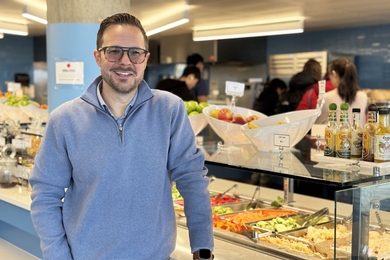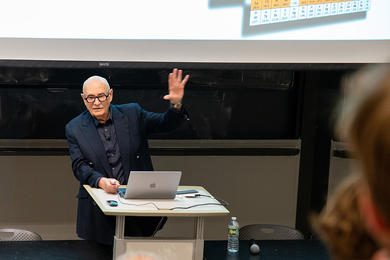What is the value of the MIT Leaders For Global Operations (LGO) program, and what elements have helped produce successful alumni? According to some of those who've risen to senior industry positions, the breadth of the LGO program and its lessons in leadership and versatility have been invaluable.
The Class of 1992 has been particularly successful, with 71 percent of its 34 members having achieved an executive position. At least 59 percent of the classes of 1990 (the first graduating class), 1991, 1993, and 1994 have been similarly successful by that measure.
Founded in 1988 as the MIT Leaders for Manufacturing program (LFM), LGO has expanded its focus from manufacturing to all operations and has added industry partners that reflect that focus while still retaining its foundation in teaching a broad set of skills in manufacturing management and leadership.
“The whole program was just an overall good, broad grounding and toolkit for understanding all aspects of what it takes to run a business, particularly with a product and a technology component. I have worn every hat and feel capable of leading people in any role,” says Keith Camhi SM ’91 MBA ’91, founder of Great Play Interactive Children's Gyms, which was named to Entrepreneur’s “Franchise 500” in 2013 and 2014.
“The LGO program helps students to see multiple sides of a problem, to search for the broader context, and to bring multiple viewpoints to bear,” says Ed Lee SM ’94 MBA ’94, who is now a vice president and general manager at the Kellogg Company in Dublin, Ireland.
“LFM gave me a playbook that has proven to be powerful and versatile,” says Jeff Wilke SM ’93 MBA ’93, senior vice president for consumer business at Amazon.com — a company that didn’t even exist when he was a student in the program (Amazon was founded in 1994, a year after he graduated).
Among the skills that Wilke acquired were are an understanding of constraint management and how to apply the statistical tools of optimization and process control to supply chain. “At Amazon, we’ve built all of our own supply chain software leaning heavily on the analytical techniques at the center of LGO’s curriculum,” he says.
Bill Anderson SM ’95 MBA ’95 was looking at business schools after four years as a chemical plant engineer. “I was immediately drawn to the more analytically rigorous approach at Sloan and the chance to debate corporate strategy in the morning and design bioreactors in the afternoon,” he says. Anderson is now global product strategy and chief marketing officer for Roche Pharmaceuticals.
Connecting with experts across an organization
Alumni also credit LFM / LGO with giving them not just a breadth of skills but also the insight to connect with people at every level of an organization and seek out skills in others in order to succeed.
“It opened my eyes and my mind to all sorts of different solutions. I certainly didn’t master every tool out there, but I’m at least aware that they are out there, and when appropriate I search for the right person with that toolset who can help myself and the company I work for,” says Michael Chrzanowski SM ’93 MBA ’93, now executive vice president of purchasing, operations and engineering services at Yamaha Motor Manufacturing Corporation of America.
“Being able to connect with experts across the organization is vital, whether it concerns statistical approaches to clinical experiments, challenges with scaling up biotech manufacturing process, analysis of complex and long-term investments, or sales force incentives,” Anderson says.
“LFM taught me to treasure the leaders who run our operations. The most valuable of these leaders can personally lead a deep dive into the metrics of their operation and then pivot around and make an authentic connection with an hourly employee,” Wilke says.
Another strength of the program beyond its curriculum, alumni say, are its people — the faculty and other students they learn from. “I had great and brilliant classmates. I worked quite a bit with Jeff Wilke, Rod Copes, Dave Seitelman, Joan Rubin, Steve Chong, and Mike Blatz. All of them have had very successful careers,” Chrzanowski says. “We all had our strengths and weaknesses — I’m not sure Jeff had any weaknesses except being a bad karaoke singer — and worked to help each other. This environment and working with some talented people helped me to become the leader I am today.”
A win for partner companies
The LGO program has added value for its partner companies as well as its individual graduates. Boeing, which has been a partner since LGO's founding, currently employs 66 LGO alumni, including Tim Copes SM ’92 MBA ’92, now vice president of material services.
"It's fair to say that LGO is now part of the DNA of The Boeing Company," says Copes, adding that the program gave him "a rigorous grounding in both the technical and business aspects of the 'value chain' between a good idea and a delivered product."
"Talent coming from LGO has moved Boeing much further as a manufacturer than if we did not have these leaders," adds Lindsay Anderson SM ’93 MBA ’93, vice president for quality in Boeing Commercial Airplanes.
LGO has changed and grown over the years, notably with the addition of international plant visits and internships, as well as internationally headquartered company partners and partner organizations in new fields such as health care.
“LGO has truly expanded with a global viewpoint. Hot topics come and go, and the program has done a good job of addressing them. The basic premise, though, is sound: that a combined technical, business, and leadership program is the best possible training for future business leaders,” Lee says. “The thing that LGO / LFM can do in order to continue to differentiate itself is to build upon that ‘leadership’ pillar more and more.”
Leadership is central to the program
Leadership is a core skill taught in LGO, and the program’s success in this area has implications even beyond its original mission.
“It's one thing to be an expert or an executive; it's another to be a leader, so including the word ‘leader’ in the program's title and building leadership classes and seminars into the curriculum makes this program uniquely valuable,” says Hollie Schmidt SM ’92 MBA ’92, vice president of scientific operations for the Accelerated Cure Project for Multiple Sclerosis. “I was definitely a different person coming out of LFM than I was going in because of this focus. Maybe LGO should project this vision outward and help MIT create ‘Leaders for Science,’ ‘Leaders for Architecture,’ etc.”
“The program totally met its promise of preparing leaders with rigorous education in key technical and business topics,” says Bill Anderson. “Perhaps an even greater need for American companies is developing technically competent executives for fields beyond manufacturing and operations, and I would encourage the LGO leadership to keep thinking broadly.”
“My experience in the military prepared me to be a leader, and the LFM program provided us with a broad perspective on the types of leadership challenges we would face as young (and now senior) business leaders. Our exposure to and interaction with senior industry leaders and cutting-edge professors allowed us to acquire the critical skills required to be effective and successful business leaders in a rapidly changing, competitive world,” says Rick Dauch SM ’92 MBA ’92, who was a combat company commander in the U.S. Army before coming to MIT and is now president and chief executive officer at Accuride Corporation.
“The founders of LFM — Kent Bowen, Don Rosenfield, Tom Magnanti, and Bill Hanson — should be proud because they've accomplished what they wanted to do: create the next generation of leaders who will lead industrial corporations,” Dauch says.









